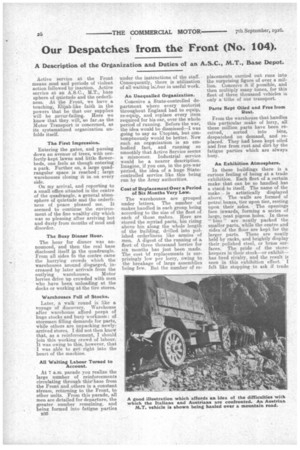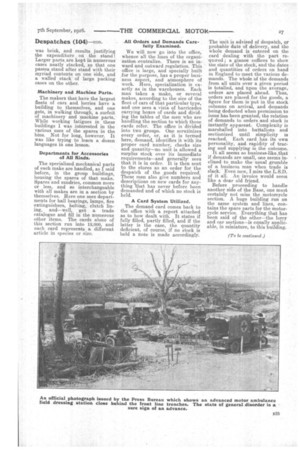Our Despatches from the Front (No. 104).
Page 6

Page 7

If you've noticed an error in this article please click here to report it so we can fix it.
A Description of the Organization and Duties of an A.S.C., M.T., Base Depot.
Active service at the Front means mud and periods of violent action followed by inaction. Active service at an A.S.C., M.P., base sphere of quietude and the orderliness. At the Front, we have a touching, Elijah-like faith in the powers that be that our supplies will be never-failing. Here we know that they will o far,as the Motor Transport is concerned, as its systematized organization unfolds itself.
The First Impression.
Entering the gates, and passing down an avenue of trees, with nerfectly-kept lawns and little flowerbeds, one feels as though entering a park. Further on, a large quadrangular space is reached ; large warehouses closing it in on every side.
On my arrival, and reporting to a small office situated in the centre of the quadrangle, a general atmosphere of quietude and the orderliness of peace pleased me. It seemed to continue the environment of the fine wealthy city which was so pleasing after arriving hot and dusty from months of mud and disorder.
The Busy Dinner Hour.
The hour for dinner was announced, and then the real base disclosed itself in the quadrangle. From all sides to the centre came the hurrying crowds which the warehouses around disgorged, increased by later arrivals from the outlying warehouses. Motor lorries drive up crowded with men who have been unloading at the docks or working at the tire stores.
Warehouses Full of Stocks.
Later, a walk round is like a voyage of discovery. Warehouse after warehouse afford peeps of huge stocks and busy workmen : of storemen filling demands for parts, while others are unpacking newlyarrived stores. I did not then know that, as a reinforcement, I should join this working crowd of labour. It was owing to this, however, that I was able to get right into the heart of the machine.
All Waiting Labour Turned to Account.
At 7 a.m. parade you realize the large number of reinforcements circulating through -thisl base from the Front and others in a constant stream, returning to the Front, to other units. From this parade, all men are detailed for departure, the greater number remaining, and being formed into fatigue parties
B30 under the instructions of the staff. Consequently, there is utilization of all waiting lalkur in useful work.
An Unequalled Organization.
Conceive a State-controlled department where every motorist throughout England had to equip, re-equip, and replace every item required for his car' over the whole period of running. Before the war, the idea would be dismissed—I was going to say as Utopian, but contemptuously would be better. Now such an orgoinization is an embodied fact, and running so smoothly that Active Service seems a misnomer. Industrial service would be a nearer description. Imagine, if you can, in the pre-war period, the idea of a huge Statecontrolled service like this being run by the Army authorities.
Cost of Replacement Over a Period of Six Months Very Low.
The warehouses are grouped under letters. The number of makes handled in each group being according to the size of the fleet of each of those makes. Here are stored the myriad parts, bin rising above bin along the whole length of the building, drilled into polished orderliness like armies of men. A digest of the running of a fleet of three thousand lorries for six months has just been made. The cost 'of replacem-ents is surprisingly low per lorry, owing to the breakage of large assemblies being few. But the number of re placements carried out runs into the surprising figure of over a million. Conceive it if possible, and then multiply many times, for this fleet of three thousand vehicles is only a tithe of our transport.
Parts Kept Oiled and Free from Rust.
From the warehouse that handles this particular make of lorry, all these million parts have been re
ceived, sorted into bins, despatched on demand, and replaced. They had been kept oiled and free from rust and dirt by the fatigue parties which are always busy.
An Exhibition Atmosphere.
In these buildings there is a curious feeling of being at a trade exhibition. Each fleet of a certain make that can be so handled has a stand to itself. The name of the make is artistically displayed above. The .walls are formed of petro.. boxes, tier upon tier, resting upon their sides. The openings face inwards, forming a series of large, neat pigeon holes. In these " bins " are neatly packed the smaller parts, while the centre and sides of the floor are kept for the larger parts. These are neatly held by racks, and brightly display their polished steel, or brass surfaces. The pride of the storekeepers in their stock—or exhibit— has bred rivalry, and the result is seen in this exhibition effect. I felt like stopping to ask if trade
was brisk, and results justifying the expenditure on the stand ! Larger partsare kept in numerous cases neatly stacked, so that one passes stand after stand with their myriad contents on one side, and a walled stack of large packing cases on the other.
Machinery and Machine Parts.
The makers that have the largest fleets of cars and lorries have a building to themselves, and one gets, in walking through, a surfeit of machinery and machine parts. While working fatigues in these buildings I was interested in the various uses of the spares in the bins. Not for long, however. It was like trying to learn a dozen languages in one lesson.
Departments for Accessories of All Kinds.
The specialized mechanical parts of each make are handled, as I said before, in the group buildings, housing the spares of that make. Spares and sundries, common more or less, and so interchangeable with all makes are in a section by themselves. Here one sees departments for ball bearings, lamps' fire extinguishers, belting, clutch lining, and—well, get a trade eata)ogue and fill in the numerous other items. The cards alone of this section run into 12,000, and each card represents a different article in species or size.
All Orders and Demands Carefully Examined.
We will now go into the office, whence all the lines of the organization centralize. There is an inward and outward regulation. This office is large, and specially built for the purpose, has a proper business aspect, and atmosphere of work. Here, specialization is exactly as in the warehouses. Each man takes a make,. or several makes, according to the size of the fleet of cars of that particular type, and one sees a vista of barricades carrying boxes of cards and dividing the tables of the men who are handling the section to which those cards refer. The office is divided into two groups. One scrutinizes every order, or, as it is termed here, demand, identifies it with its proper card number, checks size and quantity—no unit is allowed a surplus stock over its immediate requirements—and generally sees that it is in order. It is then sent to the stores as an order for the despatch of the goods required. These men also give numbers and descriptions on new cards for anything That has never before been demanded and of which no stock is held.
A Card System Utilized.
The demand card comes back to the office with a report attached as to how dealt with. It states if fully filled, partly filled, and if the latter is the case, the quantity deficient, of course, if no stock is held a note is made accordingly.
The unit is advised of despatch, or probable date of delivery, and the whole demand is entered on the card dealing with the part required; a glance suffices to show the state of the stock, and the dates and quantities of orders on hand in England to-meet the various demands. The whole of the demands from all units over a given period is totalled, and upon the average, orders are placed ahead. Thus, orders are placed for the goods, a figure for them is put in the stock columns on arrival, and demands being deducted when permission to issue has been granted, the relation of demands to orders and stock is instantly apparent. Vomplexity is marshalled into battalions and sectionized until simplicity is reached. Each card has its own personality, and rapidity of tracing and supplying is the outcomes It all seems so business-like.that if demands are small, one seems inclined to make the usual grumble of a business man when trade is slack. Even now, I miss the L.S.D. of it all An invoice would seem like a dear old friend.
Before proceeding to handle another side of the Base, one must certainly not miss the motorcycle section. A huge building run on the same system and lines, contains the spare parts for the motorcycle service. Everything that has been said of the other—the lorry and car sections—is equally applicable, in miniature, to this building.
(To be continued.)




















